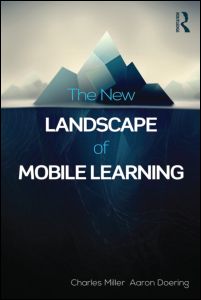New Book Chapter: iTeach and iLearn with iPads in Secondary English language arts
A book chapter I wrote with Gregory Russell (@mrgsrussell), “iTeach and iLearn with iPads in secondary English language arts,” is now out in print in the amazing book, The New Landscape of Mobile Learning: Redesigning Education, edited by Charles Miller and Aeron Doering. This research stems from my larger research study of a suburban high school in their first year of implementing iPads across their high school population. Following is a description of our chapter (note: since we wrote this chapter almost two years ago, there has been empirical research published on the topic.)
“iTeach and iLearn with iPads in secondary English language arts” Chapter Abstract
Tablet computers like the iPad seem to be well-suited for educational purposes, but no empirical research yet exists that examines its potential. This chapter shares the stories of Brett and Julie, two veteran high school English teachers who are integrating iPads into their classrooms for the first time as a part of a 1:1 iPad initiative at Hilly High School. We share an analysis of their practices, developed over the past year via weekly classroom observations, formal interviews and numerous informal discussions. From these risk-taking practitioners, we identify and discuss issues related to pedagogy, assessment, new media literacies, efficiencies, student behavior, engagement, distractibility, and academic integrity. Results indicate that the iPad improves the efficiencies of learning activities but also introduces new classroom management issues. Many teaching and learning activities with the iPad can be both engaging or distracting. Our findings may prove useful to districts, schools, and practitioners who venture to establish similar ubiquitous tablet-supported educational innovations.
The book is available here:
http://www.routledge.com/books/details/9780415539241/
http://www.amazon.com/The-New-Landscape-Mobile-Learning/dp/0415539242
As always, if you would like to read my chapter and are unable to get a copy, please email me at joanh @ austin . utexas . edu
New Book Chapter: iTeach and iLearn with iPads in secondary English language arts
I co-authored a book chapter with Ph.D. student, Gregory Russell, that is due out in Spring 2013. The chapter emerges from my research study iTeach and iLearn with iPads and reflects a year of data collection in a high school that created a ubiquitous environment for iPad-supported teaching and learning. The article is set within what I think will be a superb collection of chapters in Charles Miller and Aaron Doering’s The new landscape of mobile learning: Re-designing education in an app-based world.
Scholarly Reference to the Book Chapter:
Russell, G. S. & Hughes, J.E. (In Press/Pub Date: Spring 2013.) iTeach and iLearn with iPads in secondary English language arts. In C. Miller & A. Doering (Eds.) The new landscape of mobile learning: Re-designing education in an app-based world. New York: Routledge.
Following is the abstract of the chapter:
Tablet computers like the iPad seem to be well-suited for educational purposes, but no empirical research yet exists that examines its potential. This chapter shares the stories of Brett and Julie, two veteran high school English teachers who are integrating iPads into their classrooms for the first time as a part of a 1:1 iPad initiative at Hilly High School. We share an analysis of their practices, developed over the past year via weekly classroom observations, formal interviews and numerous informal discussions. From these risk-taking practitioners, we identify and discuss issues related to pedagogy, assessment, new media literacies, efficiencies, student behavior, engagement, distractability, and academic integrity. Results indicate that the iPad improves the efficiencies of learning activities but also introduces new classroom management issues. Many teaching and learning activities with the iPad can be both engaging or distracting. Our findings may prove useful to districts, schools, and practitioners who venture to establish similar ubiquitous tablet-supported educational innovations.
We welcome questions and feedback regarding our work with this project. We are currently working on a manuscript focused on school leaders’ perspectives on the iPads and support mechanisms or iPad technology integration.
If you are unable to obtain a copy of this work, please email me [joanh at austin dot utexas dot edu], and I will gladly share a copy with you.
